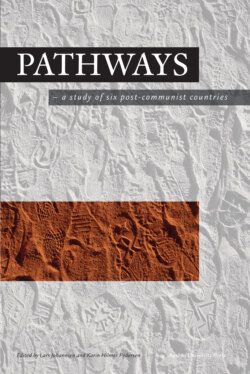Читать книгу Pathways - Группа авторов - Страница 12
На сайте Литреса книга снята с продажи.
The international context
ОглавлениеDomestic transformation after communism did not take place in a vacuum. Globalisation and systemic pressures have increasingly called the distinction between politics within the state and politics among nations into question. The international context in many respects sets the stage for elite decisions. A central distinction argued by Levitsky and Way (2005) concerns the vulnerability of governments to external pressure and how committed they are to implementing internationally advocated reforms. For example, elite decisions regarding economic reforms were heavily influenced by the Washington consensus, even though its liberal recommendations were not followed by all transition countries.
The international context also shaped decisions on state building. This is most evident in Estonia, Poland, the Czech Republic and Slovenia, where the European Union set the stage in a process characterised as ‘the most massive international rule transfer in recent history’ (Schimmelfennig & Sedelmeier, 2005, 6). Outside the realm of direct EU conditionality, the international community, international donors and trade partners have put pressure on domestic elites. Eduard Shevardnadze’s comeback and his long rule in Georgia can be seen as due to his close international connections – he was the ‘pet of the West’, which gave him the opportunity to divert Western financial assistance to serve his own interests and those of his proponents. In contrast, Kazakhstan reflects the importance of having natural resources, in this case oil. Oil income has given Kazakh leaders more freedom to make domestic policies without external powers having leverage on them. On the other hand, dependency on foreign investments to extract oil resources has made it necessary to enhance transparency and meritocracy in the financial sector as well as in pockets within the state administration.
In a similar vein the international context has been formative with respect to nation building. Related not only to the historical fact of Soviet occupation but also to fear of Russian irredentism, the Estonian elite was empowered to exclude a Russian minority from political influence with little criticism from the Western international community. In contrast, the number of Russians in Kazakhstan and its proximity to Russia made it difficult for the elite to construct the country on a concept of a Kazakhi nation.
Even though our understanding of domestic change is only complete when the international context is taken into consideration, we do contend that the choices made in regime transformation are solely contingent upon domestic forces and demands but are like intertwined strands in the quadruple transition process.
